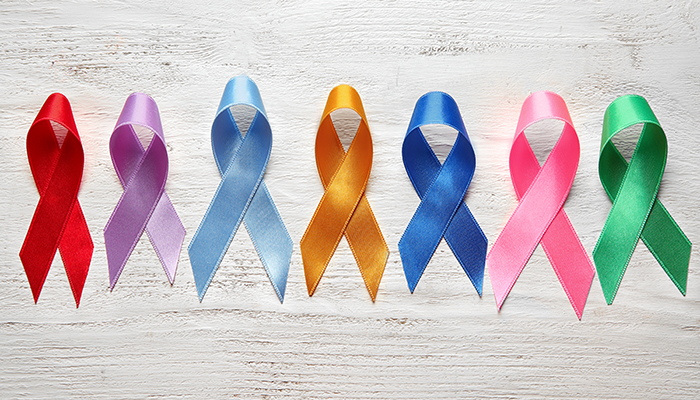Learn more at www.answers4agingbutte.com or www.answers4aginggtf.com
A monthly newsletter
for families caring for an aging loved one
May/June 2022 Print
Living with cancer as a chronic condition
 Has your loved one been diagnosed with cancer? The vast majority (67%) of people with cancer live for another five years or more. A cancer is considered “stable” or “controlled” when tumors shrink or at least temporarily stop growing. This is not the same as being cured—no tumors—but it does make cancer more of a manageable chronic disease, like diabetes or asthma.
Has your loved one been diagnosed with cancer? The vast majority (67%) of people with cancer live for another five years or more. A cancer is considered “stable” or “controlled” when tumors shrink or at least temporarily stop growing. This is not the same as being cured—no tumors—but it does make cancer more of a manageable chronic disease, like diabetes or asthma.
Learning to live with cancer. Ideally, when cancer becomes chronic, the survivor learns to take it on as simply another aspect of life. A return to “the way it was” isn’t likely. For example, their daily or weekly schedule may now need to accommodate dietary changes, treatment sessions, or a rigid medication protocol. But there can be a happy and fulfilling “new normal” for months or years. Here are some tips to help your loved one adjust (and you too, as a family member).
- Accept that you don’t have control. The sooner you make peace with this, the better your overall well-being.
- Acknowledge your fears and let them go. It’s natural to be afraid. But fixating on fear doesn’t cure the cancer. Let your worries go, as much as possible, to liberate energy for things that actually can make a difference to your day.
- Get support. From support groups, counselors, clergy, friends, and family. Feelings are easier to release when you express them.
- Control what you can. While you can’t control the cancer, you can create a more predictable, rewarding life. For example, establish daily routines. Create and work toward realistic personal goals.
- Prioritize your time. Most cancer survivors report that their “new normal” includes a new emphasis on doing things that are meaningful or fun.
- Emphasize wellness. Good sleep, healthy foods, relaxation, and exercise all make it easier for the body to marshal its forces against the cancer.
- Stay informed about the disease and treatments. Knowing the options and understanding what to expect promotes your ability to work effectively with providers.
- Take each day as it comes. Feelings of fear, anger, or sadness often arise. Let them come, and go. Notice the peace and pleasures of the day, too.
- Seek and savor reasons to feel grateful. Even though things are not as you might wish, simple joys are still possible. Strive for them.
When you envy others
 Do you ever look at friends and find yourself mad or upset because they have free time? They don’t have a relative that needs help? You might even wish they had it harder, had some real challenge in their life. And then you feel guilty. If this sounds familiar, you are not alone. Envy is a natural human emotion. It can be very strong—and unpleasant to experience.
Do you ever look at friends and find yourself mad or upset because they have free time? They don’t have a relative that needs help? You might even wish they had it harder, had some real challenge in their life. And then you feel guilty. If this sounds familiar, you are not alone. Envy is a natural human emotion. It can be very strong—and unpleasant to experience.
Tips for easing envy
- Acknowledge your feelings. We are taught that envy is wrong or shameful. It’s usually an unconscious way to mask a more difficult emotion. It may be easier to be mad at others than acknowledge your sadness or resentment toward the person you care for. Look for the other feelings beneath your envy.
- Identify your needs. Envy is a response to loss. Picture that friend who triggers your envy. What is it they have that you don’t? A social life? Time for themself? A well partner? Their health? You may feel you no longer have control over your life. Do these concerns ring a bell?
- Share your feelings. If not with friends, consider a caregiver support group, or talk with a counselor. Getting your feelings out in the open will help you gain perspective and support.
- Strategize to get some time off. As impossible as it may seem to take a break, envy is a sign that you need to recapture some of your noncaregiving self. Rather than let it corrode your spirit, use envy as a warning sign that some free time is in order.
- Find the positives. Some say that envy is counting the blessings of others. Consider, instead, what caregiving has contributed to your life. Perhaps you have developed greater patience and compassion or learned valuable new skills.
Primary care providers
A primary care provider (PCP) is charged with monitoring and treating a person’s whole body. Specialists abound and indeed are important. But we are more than the sum of our organs. Your relative’s PCP helps ensure that specialists are not doing things that counteract each other. If you are looking for a new PCP, there are several types of providers to consider.
Family practice doctors. As the name implies, this is a physician who can care for everyone, regardless of age. Their residency covers pediatrics to geriatrics. The downside is they cannot stay deeply up to date on all age groups. Much as your loved one may have been with the same family doctor for decades, it could be time to switch.
Internist. Internists focus on the health needs of adults. Their residency is 100% adult medicine. Some internists pursue additional studies to add a specialty, for instance in rheumatology or neurology.
Geriatricians. These are internists who did specialty training on the needs of older adults. They are versed in the management of multiple chronic diseases. They also understand the complex psychosocial changes of aging, such as loss of spouse and/or friends, loss of independence. Often their approach is more holistic, and they are more apt to consider the importance of quality of life. Unfortunately, there is a shortage of geriatricians. An alternative is an advance practice nurse or physician assistant with a specialty in geriatrics.
Concierge doctors. New to the landscape is the primary care doctor who has opted out of being an employee in a medical group. Instead, they charge a yearly membership fee to keep their practices small. With a “concierge doctor,” you are seen within 48 hours and appointments are longer. Medicare does not pay for the membership fee. This can run $1200–$2400 per year.
Return to top